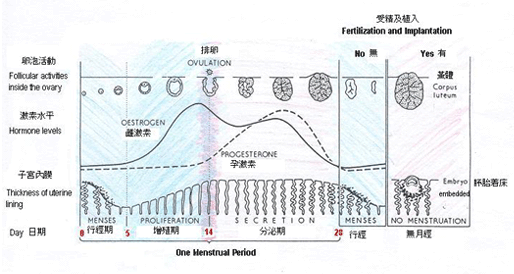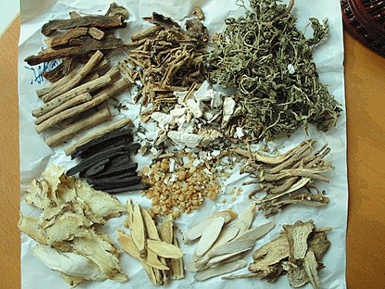Long ago, TCM realized that menstruation was not simply just womb bleeding, but a surface phenomenon resulted from the physiological fluctuations inside the body. Menstruation occurs about every 28 days in women. TCM believes changes within body during a menstrual cyclic are closely related to kidney functions and the circulations of blood and qi (vital energy). They dominate the production of tian gui and the activities in the extra meridians, leading to the menstrual cycle attaining a natural rhythm. Generally speaking, the menstrual processes reflect the dynamic changes of kidney yin, kidney yang, blood, qi and certain organs inside the body.
With references to western knowledge on female physiology and endocrine activities, modern TCM physicians divide a menstrual cycle into four phases:

Physiological changes in a menstrual cycle
Post menstruation phase (proliferation)
After the menses flow stop, the basic body temperature becomes lower, the estrogen and progesterone levels drop, and the uterine lining starts to repair. TCM believes the Thoroughfare Vessel meridian has evacuated its blood, the kidneys must enrich essence gradually so as to produce sufficient tian gui and let the blood flow back to the meridian.
For those who have heavy menses flow, it is easy to experience symptoms like dizziness, palpitations, spiritual fatigue, general weakness, lumbar soreness and knee weakness, which are usually resulted from yin and blood deficiencies, liver and kidney insufficiencies, or heart and spleen deficiencies. Therefore, TCM usually emphasizes nourishing yin and enriching blood in this phase, so as to ensure the enrichment of kidney essence and the menstrual cycle evolving smoothly.
True chance phase (ovulation)
This happens around the 14th day of the menstrual cycle. Kidney yin becomes abundant in particular the essence, and tian gui comes to take action. These facilitate the kidney yang becoming active, activities of blood and qi are remarkable, stimulating an egg in ovarian follicles to mature, burst and release. TCM regards this phase as a transitional timing that the kidney yin transforms into kidney yang, a chance for ovulation.
Premenstrual phase (secretion)
TCM views this phase as the gearing of both kidney yin and kidney yang. Abundance in the kidney yin supports the kidney yang to fully take actions, the uterine lining grows and thickens, and more blood and qi flow to the uterus. Since the kidney yin will be consumed considerably during this phase, spleen and stomach have to transform and supply adequate nutrient essence, in order to maintain the kidney yin and yang change and grow in a cyclic and balanced manner. These can ensure the tian gui remaining at the highest level, and the Thoroughfare Vessel and Conception Vessel are properly consolidated. All of these are prepared for conception.
Since the liver is involved actively in redistributing the blood and qi (vital energy) in this phase, some individuals may occur liver qi stagnation, the premenstrual symptoms include breast tenderness, mild fever, abdominal distention, even sharp distending pain in the breasts with severe distention in the lower abdomen.
Menstruation phase
In case if the ovum is not fertilized, the level of tian gui has declined, and less kidney yin transforms into kidney yang; excess blood and qi cannot stay in the uterine lining anymore and then shed, the menses flow occurs. After the uterine lining has cleaned, a new menstrual cycle starts soon, the kidney yin and yang will change and grow in a cyclic and balanced manner again.
For menstrual irregularities, TCM physicians will try to identify any abnormal change occurred in each phase and incorporate special skills to enhance the progression of the four phases. The herbal remedies will be designed according to the health needs of particular segments of a menstrual cycle, as well as individual constitution. When each phase occurs smoothly, the body is in its best condition and regular menstrual cycles will be attained.
Physicians will follow some general guidelines in regulating the menstrual cycles:
| Proliferation
(6th to 10th day) |
This phase should ensure the repairing of uterine lining and development of the ovarian follicles. Physicians usually focus on reinforcing liver, replenishing kidneys, invigorating spleen, and harmonizing stomach, so that there are sufficient blood and kidney essence, and blood and qi circulations are in proper condition too. |
| Ovulation
(11th to 16th day) |
This phase is typically referred as the ovum (egg) is released from the ovary. TCM usually focuses on reinforcing both liver and kidneys, nourishing essence and blood, warming kidney yang, unblocking the collaterals, activating the local blood flow and removing any stasis, so that ovulation is achieved. |
| Secretion
(17th to 28th day) |
This phase should ensure further ripening of the released follicle inside the ovary and thickening of uterine lining. TCM usually focuses on reinforcing both kidney yang and kidney yin, and also replenishing blood and qi. When there is premenstrual problems, skills like soothing liver, regulating qi, facilitating body fluid movements and calming heart are applied. |
| Menstruation
(1st to 5th day) |
This phase usually does not need management; however when there are symptoms like non-smooth menses flow or painful menstruation, TCM will focus on regulating blood and promoting qi movement. |
Since the herbal remedies are customized individually, and there are hundreds of herbs available, they are applicable to all the conditions that presented with menstrual irregularities, particularly for women who suffer from functional uterine bleeding, menstrual pain, endometriosis and dysfunctional infertility. Unlike conventional hormonal therapy, herbal therapy has little adverse effects and less likely to effect ovary functioning after long-term use. In addition, the herbal therapy is also beneficial for overall improvement and general health.

A prescription for menstrual disorder
Simplified Herbal Therapy for Menstrual Irregularities
For this therapy, physicians will simply divide a menstrual cycle into two phases, and provide treatment as below:
- First half phase (luteal phase): herbs are mainly selected to promote the ovulation process and replenish kidney yin, such has angelica root, processed rhemannia rhizome, fleece flower root, motherwort seed, dodder seed, glossy privet fruit and Chinese wolfberry. The remedies are usually provided for seven days only.
- Second half phase : herbs are mainly selected to reinforce liver and nourish kidney, and also aid with promoting blood and qi circulations, such as cornus fruit, yerbadetajo herb, eucommia bark, achyranthes root, Chinese wolfberry, astragalus root, turmeric root-tuber, red peony root, Sichuan lovage rhizome and dried tangerine peel. The remedies are usually provided daily until the day before the menses flow comes.
** You should consult your physician if you are under hormone therapy or undergoing artificial insemination, to avoid interference with herbal medicines.


